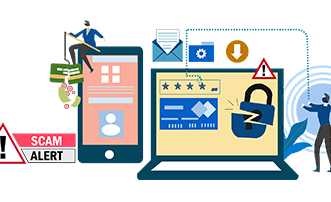Older adults are often targeted by scammers because they are perceived as having more wealth and a trusting nature. With the proper knowledge and support, you can protect yourself from scams that threaten to take advantage of you. Here are the 7 most common scams:
1. Bank/Government Imposter Scam
Scammers try to convince you they are your bank or a government agency, like the local police, Internal Revenue Service (IRS), Social Security Administration, or Medicare, and you need to give them money or personal information to prevent something bad from happening to you or your account, or to pay a supposed fine.
2. Tech Support/Phishing Scam
Scammers contact you either by phone or a message on your computer claiming to be from a legitimate company like Microsoft/Apple/Google and your computer is “infected” or has “an issue” they need to fix. They will ask to gain access to your computer to “fix” the issue, then will attempt to steal your private information or make you pay for their services (often in the form of gift cards or wire transfers).
3. Grandchild/Family Scam
Scammers call pretending to be a loved one, often a grandchild, who asks them for money for an urgent financial problem (ex. overdue rent, car problems, or jail bond). Scammers often do research of who they are pretending to be to make it more believable and pull at your heart strings. They will often plead and demand secrecy.
4. Virtual Kidnapping Scams
Scammers call you claiming to have kidnapped a loved one and you need to pay a ransom for their safe return. Your phone may even say your loved one’s name and phone number. They may cry, make demands, and even have you “talk” to your loved one, but it is a scammer acting this way to get what they want.
5. Fake Prize Scam
This scam involves a scammer trying to convince you that you won something through a sweepstakes/lottery/charity, but you need to send them money, cash, or gift cards to cover supposed taxes or fees. Once you pay the supposed taxes or fees, no prize arrives.
6. Fake Check/Overpayment Scam
Scammers pay you with a check for a legitimate item/reason. Then they write the check for more than the purchase price or ask for a refund and ask you to wire back the money after you deposit the check. You deposit the check and wire the funds back to the “buyers.” Later, the check bounces, leaving you liable for the entire amount.
7. Romance/Catfishing Scam
A “Catfish” is when someone creates a false identity and builds a relationship with you, usually over a dating app or social media website like Facebook. The scammer will tell you stories and ask questions about your life to get you to care for them so you will give them money (often in the form of gift cards or wire transfers).
Red Flags/Warning Signs of a Scam:
- They rush, pressure, or threaten you. They often use an extreme sense of urgency to stop you from thinking too much about what they are demanding.
- You are asked to keep secrets. They will attempt to tell you who or what to say so they are not found out. They often say you have done something wrong and to not tell anyone or you will get in trouble.
- Asking for a very specific payment option like gift cards, wire transfers, or tell you to open a bank account for them. Scammers often demand these types of payment because they do not require photo IDs to collect and there is often no way of recovering this money.
- You are asked for private information. Some questions may be obvious like, “What is your Social Security number?” However, they can also ask questions that may seem conversational but are actually common security questions used to protect your accounts. Questions like, “In what city were you born?” or “What is your mother’s maiden name?” Never answer these questions over the phone without first verifying who you’re talking to.
- Someone reaches out to you unsolicited or for something you never signed up for. If it sounds too good to be true, it probably is. Remember, government agencies, like the IRS, will not initiate contact with you by phone, email, social media, or text.
Tips for How to Avoid Being Scammed:
- Don’t always believe what you see. Scammers use something called “caller ID spoofing” to make your caller ID say whatever they want. For example, you may receive a call displaying your bank’s name and phone number, or that they are a US government agency, but it’s actually a scammer.
- Don’t answer your phone. Don’t worry about being polite, if you don’t know the number or aren’t expecting a call from that person/organization, there’s no reason to accept the call. If it is a legitimate caller, they will leave a message with the important information and you can call them back after you do some research.
- Hang up. If you do answer the call but realize or suspect it’s a scam, hang up and call back at a verified number. Never call someone back with the phone number they provide you. For example, someone called you saying they are from ABC Bank and to call them back at (920) 555-0123, but you look up ABC Bank’s information and their official phone number is (920) 555-3215, call their official number or visit your local branch in person.
- Slow down. Scammers try to play with your emotions so you’re not thinking clearly. They will try to make you feel rushed, ashamed, scared, alone, or excited so you’re more likely to give them what they want. Stop and think about why they are trying to make you feel a certain way.
- Ask questions and do your research. Do not be afraid to quiz or demand they verify their information. If someone is calling you, you should verify THEIR information without giving them any of YOUR information. A legitimate caller will never dismiss your privacy concerns or refuse to answer your questions.
- Gather support. Do not be afraid to ask your family/friends for a second opinion on whether they believe something could be a scam. Do not allow anyone to rush or shame you into not asking for help. Scammers know when you ask for help they are not going to get what they want.
Even the most careful people will still fall victim to scammers. Be kind to yourself, it does not mean you are a fool or incapable. Scammers are clever and are not afraid of hurting people. Here’s what you should do if you fall victim to a scam:
1. Ask for Help
Scammers want you to feel alone, ashamed, and scared so you don’t reach out for help. Whether it is a trusted friend, family member, or advocacy program, gather a support group to protect yourself.
• National Elder Fraud Hotline – this hotline is a free resource created by the U.S. Department of Justice (DOJ), Office for Victims of Crime, for people to report fraud against anyone 60 or older.
1-833-372-8311
Monday – Friday, 9 a.m. – 5 p.m.
English/Español/Other languages available
2. Report the Scam
Contact the non-emergency police number to file a police report. For the local Green Bay Police Department, call (920) 448-3200.
3. If You Paid the Scammer
• Find your receipt, the card, or any other documentation. This may help you recover your money from the financial company or help you report the scam to the store you bought the gift card.
• Call the financial company immediately and ask for the transaction to be reversed and to file a fraud complaint. Whether it is a bank or gift card company, the sooner you contact them, the better the chance you have of recovering some of your money.
4. Credit Freeze
Consider a free “Credit Freeze,” which restricts access to your credit report, helping to prevent identity theft. To place or lift the “Credit Freeze,” create a PIN or password by contacting the three credit bureaus below:
• Equifax: (800) 685-1111
• Experian: (888) 397-3742
• TransUnion: (888) 909-8872
5. Change Your Passwords
One trick is to take a phrase, lyric, or rhyme and use the first letter of each word and add in some symbols and capital letters. Here is an example using the rhyme, “Mary had a little lamb, its fleece was white as snow.” By choosing some capital letters and substituting some letters with symbols, you can create a very strong password: Mh@Ll!fwWaS




